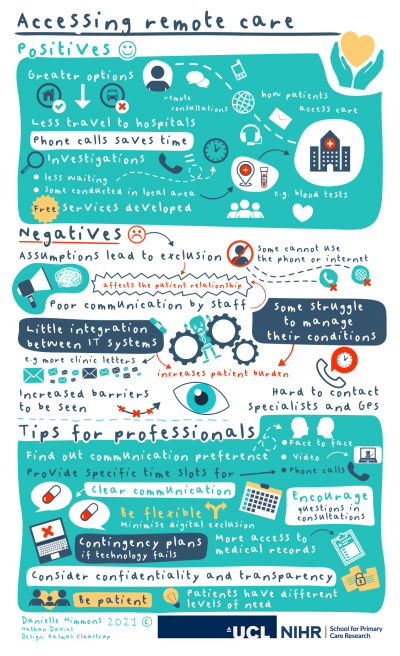
Qualitative Study
Danielle led a qualitative study exploring the experiences of people and family carers from under-represented groups in self-managing Parkinson’s, including their use of digital health to do this. This specifically focused on people from an ethnic minority background and those with significant physical, and/or sensory impairment.
This was funded by the NIHR School for Primary Care Research (SPCR) and results were presented at the national SAPC conference.
This links to the PD-Care project as it help inform the development of digital health interventions for people with complex health conditions, who may have difficulties engaging with technology.
A Summary of the Project
Problem
Digital health is thought to enable people to better manage chronic conditions. However, little is known about how people from under-represented groups with complex chronic conditions use digital health to self-manage their condition. Parkinson’s is a chronic progressive condition, where individuals can experience a range of hard to manage symptoms. Using Parkinson’s as an exemplar complex long-term condition, our aims were to explore in under-represented groups:1. Experiences of people with Parkinson’s and family carers in using digital health to self-manage Parkinson’ s 2. Expectations from digital healthcare support, and potential adaptations for optimal use.
Approach
Semi-structured interviews (n=18, four dyad interviews) were conducted remotely with 16 people with Parkinson’s and 6 family carers in 2020-2021. Participants were purposively sampled from under-represented groups: ethnic minority, non-English first language, or significant physical, sensory or cognitive impairment. Interviews were audio-recorded, transcribed and analysed using thematic analysis. Team members with lived experience of a chronic condition, including Parkinson’s, and from an under-represented group contributed throughout, including at conception, study design and interpretation of results.
Findings
Initial findings from our ongoing analysis show people with Parkinson’s and family carers most valued healthy living support, e.g. exercise classes, to improve self-management. Some people used digital health resources, most commonly NHS/Parkinson’s UK websites. Digital literacy appeared to be the biggest barrier to using digital health, regardless of background, often relating to previous occupation and confidence. However, with support, most participants were willing to try a digital support tool. No ethnic minority participant thought race or culture alters self-management and all believed there was no need for digital health interventions to be tailored to an individual’s race or culture, since Parkinson’s can affect anyone and therefore advice should be universal.
Consequences
Findings will inform the development of digital health interventions for people with complex health conditions, who may have difficulties engaging with technology. Healthcare Services must ensure technology does not create barriers in these groups.
Public Engagement

 Close
Close

